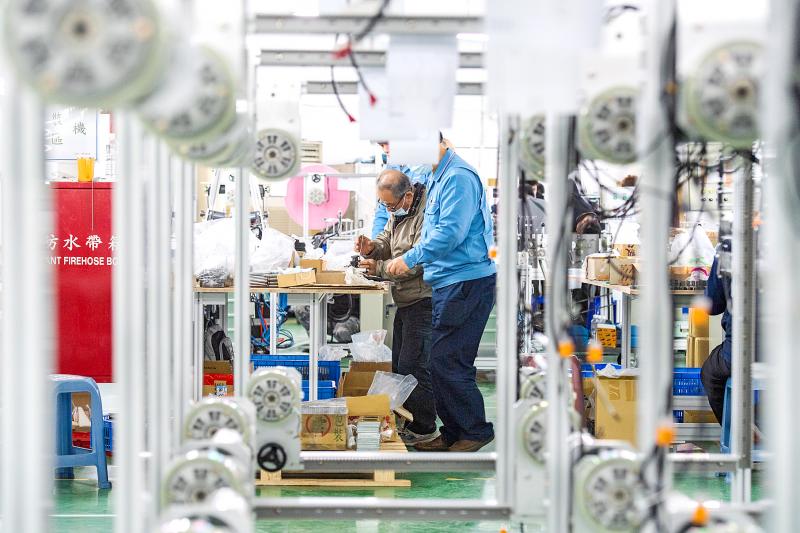The Industrial Technology Research Institute (ITRI, 工研院) has raised its growth forecast for the production value of Taiwan’s manufacturing industry to 10 percent for this year, more than double the estimate of 4.75 percent it made in November last year, as local producers benefit from the robust demand for steel, chips and electronics amid a global economic recovery.
The information and communications technology (ICT) industry would advance by 11.4 percent to NT$8.55 trillion (US$308.6 billion) this year, outpacing its previous estimate of 3.55 percent growth, the institute said in a report released yesterday.
“Strong inventory rebuild demand is adding pressure to an already tight supply of ICT products. Average selling price hikes should help boost the profit margins of local manufacturers,” it said.

Photo: CNA
Shipments of electronics, primarily smartphones, are forecast to increase 9.5 percent this year, compared with its previous forecast of 5.4 percent, driven by work-from-home, online learning and stay-at-home trends.
“Some manufacturers have upgraded equipment or added production lines to cope with the rising demand,” the institute said, adding that a surge in COVID-19 cases and a soft lockdown in Taiwan have not affected the sector, which mainly relies on outbound demand.
The production value of basic metals and machine tools is forecast to rise 10.15 percent to NT$5.67 trillion this year, it said, up from its previous projection of 4.28 percent growth, as China and other countries invest heavily in infrastructure projects to stimulate their economy, boosting steel demand.
The petrochemical industry’s output would grow 12.5 percent to NT$4.2 trillion this year, as an improving global economy pushes up demand for and prices of crude oil and petrochemical products, it said.
However, the production value of the livelihood sector — including restaurants, retail, textile and tourism-related businesses — would feel the pinch of a setback in domestic demand, with the institute predicting its output would grow 1.48 percent to NT$2.5 trillion this year, down from its previous estimate of 2.5 percent growth.
On a more positive note, the apparel and textile industry would post a strong recovery, as companies see increasing orders from global brands, while robust domestic investment would underpin the sector’s growth, it said.

Shares in Taiwan closed at a new high yesterday, the first trading day of the new year, as contract chipmaker Taiwan Semiconductor Manufacturing Co (TSMC, 台積電) continued to break records amid an artificial intelligence (AI) boom, dealers said. The TAIEX closed up 386.21 points, or 1.33 percent, at 29,349.81, with turnover totaling NT$648.844 billion (US$20.65 billion). “Judging from a stronger Taiwan dollar against the US dollar, I think foreign institutional investors returned from the holidays and brought funds into the local market,” Concord Securities Co (康和證券) analyst Kerry Huang (黃志祺) said. “Foreign investors just rebuilt their positions with TSMC as their top target,

REVENUE PERFORMANCE: Cloud and network products, and electronic components saw strong increases, while smart consumer electronics and computing products fell Hon Hai Precision Industry Co (鴻海精密) yesterday posted 26.51 percent quarterly growth in revenue for last quarter to NT$2.6 trillion (US$82.44 billion), the strongest on record for the period and above expectations, but the company forecast a slight revenue dip this quarter due to seasonal factors. On an annual basis, revenue last quarter grew 22.07 percent, the company said. Analysts on average estimated about NT$2.4 trillion increase. Hon Hai, which assembles servers for Nvidia Corp and iPhones for Apple Inc, is expanding its capacity in the US, adding artificial intelligence (AI) server production in Wisconsin and Texas, where it operates established campuses. This

US President Donald Trump on Friday blocked US photonics firm HieFo Corp’s US$3 million acquisition of assets in New Jersey-based aerospace and defense specialist Emcore Corp, citing national security and China-related concerns. In an order released by the White House, Trump said HieFo was “controlled by a citizen of the People’s Republic of China” and that its 2024 acquisition of Emcore’s businesses led the US president to believe that it might “take action that threatens to impair the national security of the United States.” The order did not name the person or detail Trump’s concerns. “The Transaction is hereby prohibited,”

Garment maker Makalot Industrial Co (聚陽) yesterday reported lower-than-expected fourth-quarter revenue of NT$7.93 billion (US$251.44 million), down 9.48 percent from NT$8.76 billion a year earlier. On a quarterly basis, revenue fell 10.83 percent from NT$8.89 billion, company data showed. The figure was also lower than market expectations of NT$8.05 billion, according to data compiled by Yuanta Securities Investment and Consulting Co (元大投顧), which had projected NT$8.22 billion. Makalot’s revenue this quarter would likely increase by a mid-teens percentage as the industry is entering its high season, Yuanta said. Overall, Makalot’s revenue last year totaled NT$34.43 billion, down 3.08 percent from its record NT$35.52